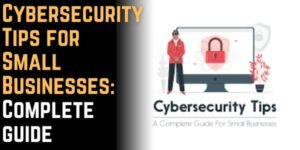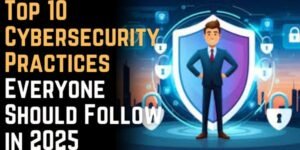How to Detect Phishing Emails: Step by step guide
Importance of Multi-Factor Authentication: Complete Guide
Best Practices for Creating Secure Passwords
Steps to Secure Personal Devices from Hacking
How to Recover from a Data Breach: Step by step guide
Cybersecurity Tips for Small Businesses: Complete guide
Top Cybersecurity Certifications 2025
Affordable Cybersecurity Solutions for Startups
How to Protect Data from Ransomware: Complete guide
Best Antivirus Software for Freelancers
Essential Small Business Cybersecurity Strategies for Beginners
Top 10 Cybersecurity Practices Everyone Should Follow in 2025
Tips to Create Strong and Secure Passwords – Cybersecurity Guide
Steps to Recover a Hacked Social Media Account: Cybersecurity Guide
How to Avoid Phishing Scams in 2025 – Essential Cybersecurity Tips
Best Free Tools to Secure Your Wi-Fi Network in 2025
How to Protect Your Personal Data Online – Best Practices for 2025
evolving daily, protecting your personal and professional data is more important than ever. From malware attacks and phishing scams to ransomware and data breaches, understanding cybersecurity can help safeguard your information from cybercriminals.
This guide will cover the fundamentals of cybersecurity, common threats, and the best ways to stay protected online.
What is Cybersecurity?
Cybersecurity refers to the practice of protecting networks, devices, and data from cyber threats. It involves various security measures, such as firewalls, encryption, antivirus software, and user awareness, to prevent unauthorized access and attacks.
Why is Cybersecurity Important?
- Data Protection – Prevents unauthorized access to sensitive information.
- Prevents Financial Loss – Cyberattacks cost businesses billions annually.
- Ensures Privacy – Keeps personal and professional data secure.
- Defends Against Cybercrime – Protects individuals and organizations from hackers.
cybersecurity-complete-guide
1. Phishing Attacks
Phishing is a cyberattack where scammers send fraudulent emails to steal login credentials and personal information. Prevention: Avoid clicking suspicious links and verify email senders.
2. Malware & Viruses
Malware includes viruses, spyware, and trojans that can compromise your system. Prevention: Use updated antivirus software and avoid downloading files from untrusted sources.
3. Ransomware
Ransomware locks your files and demands payment to restore access. Prevention: Backup important data and avoid opening unknown attachments.
4. Social Engineering
Cybercriminals manipulate users into revealing confidential information. Prevention: Be cautious of unsolicited requests for sensitive data.
5. Weak Passwords & Credential Stuffing
Hackers use automated tools to guess passwords. Prevention: Use strong, unique passwords and enable two-factor authentication (2FA).
Best Cybersecurity Practices
1. Keep Your Software Updated
Outdated software can have vulnerabilities. Enable automatic updates for your operating system, browsers, and apps.
2. Use Strong Passwords & a Password Manager
A strong password should contain uppercase and lowercase letters, numbers, and special characters. Use a password manager to store credentials securely.
3. Enable Two-Factor Authentication (2FA)
2FA adds an extra layer of security by requiring an additional verification step.
4. Avoid Public Wi-Fi or Use a VPN
Public Wi-Fi networks can be compromised. Use a VPN (Virtual Private Network) for secure browsing.
5. Recognize Phishing Emails
Be cautious of emails asking for personal details. Verify the sender and look for grammatical errors.
6. Backup Your Data Regularly
Store backups in cloud storage or external drives to prevent data loss in cyberattacks.
7. Secure Your Wi-Fi Network
Change the default router password, enable WPA3 encryption, and use firewalls for added security.
8. Install Antivirus & Firewall Protection
A good antivirus program and firewall can detect and block threats before they harm your device.
9. Be Cautious with Social Media Sharing
Limit sharing personal details online, as hackers can use this information for attacks.
10. Educate Yourself & Stay Updated
Cyber threats evolve constantly. Follow cybersecurity news and take online courses to stay informed.
Careers in Cybersecurity
With the rise of cyber threats, demand for cybersecurity professionals is growing. Common roles include:
- Cybersecurity Analyst
- Ethical Hacker / Penetration Tester
- Network Security Engineer
- Incident Response Specialist
Conclusion
Cybersecurity is essential for personal safety, business security, and financial protection. By following best practices like using strong passwords, enabling 2FA, and avoiding phishing scams, you can significantly reduce your risk of cyber threats. Stay vigilant, stay updated, and keep your digital life secure!

















